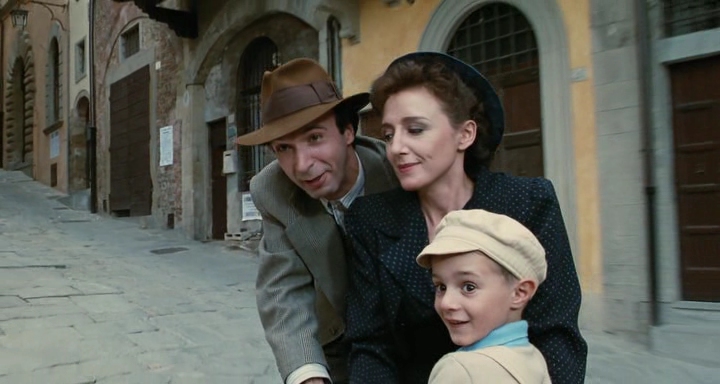
Roberto Benigni’s wonderful film Life Is Beautiful tells the story of a father who, sent to a concentration camp with his young son, creates the illusion of a “game” at the camp to shepherd his son unscathed through the horrors of the Holocaust.
I’ve been channeling the spirit of Benigni’s character in the last six weeks all day, every day, and we’re now told there’s going to be another month of this. The continuing effort to be everything for my son, to foster happy, meaningful experiences for him, to make this time special, and to do what I can to minimize the trauma he might experience as a consequence of social isolation at a tender, formative age, is the main and most important project of this time for me–possibly the most important project of my life. It is deeply fulfilling, full of joyous moments, and–yes–deeply exhausting and depleting at the same time.
The other day I was on a work call (Microsoft Teams), in which I had to explain to our dean that fronting as ideal workers on these calls echoes our fronting as ideal parents at home and is truly impossible, and that our ability to participate in the sacrifices that the situation demands–teaching nights and weekends–was not an option unless the preschools and daycares opened. A well-meaning colleague who is child-free shared with us a link to an app that silences background and child noises on work calls.
While this was kindly meant, the distortion embedded in it was colossal. I don’t want or need an app to silence my child. I need my work to recognize that my child needs me and that he is at the top of my priority list. I need to hear my child MORE, not less, during this time. The capitalist workplace would frame our family as an inconvenience to the enterprise, but it is the enterprise–the long workday, the expectations of splitting an organic life–that is the real inconvenience.
We are mourning the paid day-long structures that keep our children busy and social while we engage in the socially approved tasks of the adult working world. And of course, this virus, which is a great teacher, has exposed financial inequalities and problems in the provision of this service. But this hides from sight the ways in which this service in itself is a distortion.
In The Wild Edge of Sorrow, writing about trauma caused by family, Francis Weller observes:
Having worked with people for more than thirty years in my practice, it is clear to me that finding a target to blame is effortless. Nothing is asked of us when we simply assign fault to someone else for the suffering we are experiencing. Psychology has colluded in the blame game, pointing an accusing finger at our parents. While many of us suffered mightily because of unconscious parenting, we must remember that our parents were participants in a society that failed to offer them what they needed in order to become solid individuals and good parents. They needed a village around them—and so did we. Of course we were disappointed with our parents. We expected forty pairs of eyes greeting us in the morning, and all we got was one or two pairs looking back at us. We needed the full range of masculine and feminine expressions to surround us and grant us a knowledge of how these potencies move in the world. We needed to have many hands holding us and offering us the attention that one beleaguered human being could not possibly offer consistently. It is to our deep grief that the village did not appear.
For those of us living the life of professionals–mobile, class-jumping, geographically removed from our families for opportunities–this crisis brings up the deep grief not only over the loss of this village, but also the loss of its paid replacement. It makes me wonder about Pa and Ma in Laura Ingalls Wilder’s first book, Little House in the Big Woods (and apparently I’m not the only one.) How did Pa and Ma cope without their village? Without their extra pairs of eyes and hands? What was their internal world, as parents? Was there exhaustion? Was there mourning for community? Was there worry about the girls’ socialization? Or were their emotions shaped by an upbringing with different expectations?
Intellectualizing this feeling of grief or venting about it seems as alienated from the experience as ignoring or suppressing it. There are countless moments of grief and exhaustion and fear, as there are countless moments of elation and joy and overflowing love. Sitting with them and feeling them is important, because these moments are what is happening now. Sitting with the grief as it wells. Sitting with the joy as it erupts. Not just in formal practice. Moment to moment, throughout this rich and strange moment in our lives.




1 Comment
[…] right–and I wrote some thoughts about this a couple of weeks ago. The upshot of it all is that, in the absence of paid preschool or […]